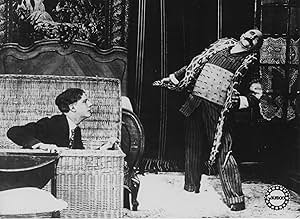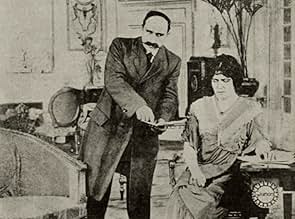Movie serials, consisting of multiple episodes with the same characters ending in cliffhangers, leaving viewers in suspense so they would gladly pay to see the next one, were becoming popular in the early 1910's. The first serial in cinema to some degree was Edison Studio's 1912 "What Happened To Mary." Although the serial consisted of 12 one-reelers, no chapter ended in a cliffhanger.
France's Gaumont Studios gets the crown for producing the first serial with dangling suspenseful endings to each episode. Gaumont bought the rights to Marcel Allain and Pierre Souvestre's very popular crime books (32 books in all) "Fantomas," published beginning in 1911. The studio's director, Louis Feuillade ("A Roman Orgy--1911), was assigned to direct a five-part serial based on the criminal portrayed in the books. Each episode concluded either in suspense or unanswered questions of what would happen next.
"Fantomas" is cinema's first crime serial portraying movie's first super-villain, a slick criminal as well as leader of a gang of masked thieves. The serial kicked off in May 1913, with the release of "In The Shadow of the Guillotine." That followed with "Juve vs. Fantomas" "The Murderous Corpse," "Fantomas vs. Fantomas," and lastly "The False Magistrate." The entire series totaled five hours and 30 minutes, with each episode was one hour to 90 minutes long. All are available for viewing.
The work of Feuillade, as seen in his 1911's "A Roman Orgy," is fluid but not innovative. His camera sits filming a tableaux of exciting action, which doesn't linger too long on a sequence. The serials' pacing in editing also gives the episodes a rapid pulse of showing events unfolding, something other early movie makers were continually learning to grasp. With a diabolical villain who was a bridge between the 19th century Victorian criminal and the 20th century serial killer, "Fantomas" entertained audiences with his numerous disguises and trickery, performing almost implausible escapes from his arch nemesis, Police Inspector Juve.
The serial would go on to inspire a wave of crime and adventure serials in the next decade, most notably Fritz Lang's "Dr. Mabuse." Feuillade himself would go on in a couple of years to write and direct his masterpiece, the much-heralded "Les Vampires," which influenced such notable directors as Alfred Hitchcock and Luis Bunuel.




























